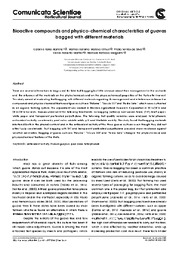Bioactive compounds and physico-chemical characteristics of guavas bagged with different materials.
Bioactive compounds and physico-chemical characteristics of guavas bagged with different materials.
Author(s): BARRETO, C. F.; KIRINUS, M. B. M.; SILVA, P. S. da; MARTINS, C. R.; MALGARIM, M. B.
Summary: Abstract: There are several alternatives to bags used for field fruit bagging but little is known about their management in the orchards and the influence of the materials on the phytochemicals and on the physicochemical properties of the fruits after harvest. This study aimed at evaluating fruit bagging with different materials regarding its management and interference in bioactive compounds and physico-chemical features of guava cultivars ‘Paluma’, ‘Século XXI’ and ‘Pedro Sato’, which were cultivated in an organic farming system. The experiment was carried in Brazilian Agricultural Research Corporation in 2014/2015 and 2015/2016 harvests. Guavas underwent the following treatments: no bagging (witness); non-woven fabric (TNT); kraft paper; white paper and transparent perforated polyethylene. The following fruit quality variables were analyzed: total phenols; antioxidant activity; carotenoids; peel color; soluble solids; pH; and titratable acidity. This study found that bagging materials interfered both in the phenol content and in the antioxidant activity of the three guava cultivars even though they did not affect pulp carotenoids. Fruit bagging with TNT and transparent perforated polyethylene provided more resistance against weather adversities. Bagging of guava cultivars ‘Paluma’, ‘Século XXI’ and ‘Pedro Sato’ changed the phytochemical and physicochemical features of the fruits.
Publication year: 2024
Types of publication: Journal article
Observation
Some of Embrapa's publications are published as ePub files. To read them, use or download one of the following free software options to your computer or mobile device. Android: Google Play Books; IOS: iBooks; Windows and Linux: Calibre.
Access other publications
Access the Agricultural Research Database (BDPA) to consult Embrapa's full library collection and records.
Visit Embrapa Bookstore to purchase books and other publications sold by Embrapa.

